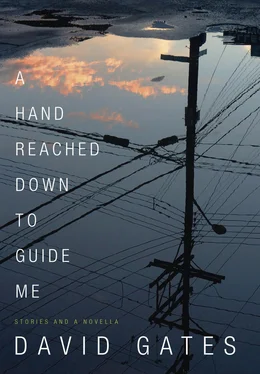Virgin Mary All-Clapped-Up Mother of God!
Cocksucking fucken syphilitic Jesus!
I could hear him singing to me—and how often did that happen anymore? So my idea was, you have the singer up there—a soprano, since you don’t want maleness to be an issue—and you see only this head, with white makeup like the Commendatore, and it’s singing from this place beyond this life but not in the next life either. I’d prefer that the singer shave her head, but I suppose that would have to be negotiable. As I say, I’ve been working toward working on it.
I don’t imagine you know the name Roberto Loomis, but they gave him an NEA a couple of years ago. He’s got CDs out on Lovely Music, which he always has them send me, and I’ll say this for him—his stuff is less unlistenable than mine. The reason I mention him, he was one of my students, back when he was Bob Loomis from somewhere in Idaho. At the time he came into my composition class, he was a death-metalhead who’d belatedly begun studying classical guitar; I got him listening to Glenn Branca and Rhys Chatham. He emailed me the other day, to say he was organizing a festival in February, in Cozumel, and did I have anything he might consider. Well now: to have one’s work considered , and by Roberto Loomis no less. Was he looking to enhance his credibility by passing me off as a neglected master? Anything, please, but an act of kindness. At any rate, it’s given me some incentive to get on with this Ted Williams piece. For which one is obliged to feel grateful. Which in turn must account for the nasty tone one hears oneself taking.
—
I had washed the dishes and mowed the lawn, and the sun hung low over the hill, an hour from touching the treetops, which would be sweet Nature’s signal that the first drink might now be poured. I was sitting on the porch, going through Ted Williams: The Biography of an American Hero with a yellow highlighter, when a Mini Cooper with Rhode Island plates pulled into the dooryard. I got up to greet Jessamyn, and as she walked toward me I saw that she’d changed from her black dress into tight jeans, the tops of her thighs just touching, and a loose denim shirt. She turned around, as if to show me those womanly charms, and looked back at the graveyard. “Gran always used to say how she’d like to be buried up there,” she said. “So now she gets to be shipped out to fucking Harrisburg.”
“Is that where her family was from? Come on up and sit.”
“His family. She hated those people. That was Gramp’s sister—with the walker? I always thought she was a witch. Can I look in the barn first? We used to make hay forts in there.”
“My daughter did the same thing,” I said. “Great place to grow up. I always thought.”
“If you can deal with a little weirdness,” she said. “I mean, you know about our ghost.”
“Your grandmother did say something about it.”
“Oh, old what’s-his-face? That was bullshit. No, there was this little girl who used to play with me. Gran wanted to think she was like my imaginary friend.”
“I never heard of a little girl.”
“Seriously? Well, maybe she—I don’t know, what does anybody know about this stuff? You don’t mind if I look in the house after? And then I’ll get right out of your hair.”
I went back to work, but Ted Williams wasn’t singing to me today—hadn’t been for weeks, really—and until he did there was no point in going inside to the piano. A breeze had come up, and every now and again I’d hear an apple hit the ground.
I heard her call hello and looked up—I’d forgotten anybody was here. This was a good sign, no? “I’m going to look around inside, okay?”
“Liberty Hall,” I said. “I should warn you, it’s going to look a little different.”
“No worries. After seeing Gran in her box?”
I listened to her footsteps going from room to room, then up the stairs. She seemed to stay a long time in what used to be Sophia’s bedroom. Then I heard her go back down to the living room and plink a single note on the piano.
She came out to the porch, sat down in an Adirondack chair, wiped her forehead with her bandanna, then let her head fall back. “This is all kind of an overload.”
“What can I get you?” I said. “Coffee? Drink?”
“I think I have to go.” She brought her head back up. “My partner’s had the kids all day.”
“Ah,” I said. So there went that, not that there’d been any prospect of a that . “How old are your kids?”
“Four and six. We started late. Well, Tonya started late. I’m too old to start late.”
“You don’t look it. I mean, from my distant perspective.”
“Yeah, Gran looked okay too. Check her in a couple of months.” She took a phone out of her shirt pocket and fingered through pictures: two generic little blond girls on a beach somewhere.
“They’re lovely,” I said. “You know, if you ever wanted to bring them up and show them around. And your partner might like to see the place.”
“She’s heard enough at this point. I don’t know, maybe when the kids are older. Right now they’re all about Disney World.”
“I remember that phase,” I said. In fact, when Sophia was six we were bringing her to the Bang on a Can Festival.
“Right?” she said. I had to think for a second to realize this was the new term of agreement. “I’m trying to remember—weren’t you a songwriter or something? I saw your piano. I wish I would’ve learned to play. Can I change my mind about the drink?”
“I was just about to get one for myself,” I said. “Gin and tonic? We’ve got a little summer still to go, yes?”
In the refrigerator, I found a nearly full bottle of tonic—I generally don’t bother with it—and a hard, shrunken lime. I got the Tanqueray out of the freezer, still two-thirds full, took a good pull at it, then quartered the lime and began pouring.
“Easy on the gin, okay?” she called. “No, actually, easy on the tonic.”
When I came out she was going at her phone again. I set her glass on the arm of her chair and took the chair next to her. “If you can master that,” I said, “we can have you playing Scarlatti in six months.”
She pocketed the phone and picked up the glass. “That’s classical, right?”
“See? You’re catching on already.” I raised my glass. “Here’s how.”
“Thanks. Cheers and whatnot.” She took a sip. “God, I used to live out here in the summer. Gran even let me bring my sleeping bag. This is where I saw Sally the first time.”
“That was the—?”
“It was like, she wasn’t there, and then she was.”
“That must’ve scared you.”
“Not really.” She took a long drink. “She was my first crush—how weird is that? She was right, exactly, there.” Jessamyn pointed over to a spot underneath the swallows’ mud nest, now empty till spring. “She had on this little blue dress with yellow—like violets or something. I remember I was playing tic-tac-toe against myself.”
“Did other people see her?”
“Yeah, Tonya doesn’t believe me either.” She took another drink. “Jesus.”
“I can get you more tonic.” I could feel mine taking hold, too—and no wonder. I saw that I only had about that much left.
“No, it’s good,” she said. “This is the first time I’ve relaxed since they called about Gran.”
“Make yourself at home,” I said. “Be right back.” I got up and went into the kitchen, ran water to cover the sound of the freezer opening and took another good pull to hold me until I could decently refill my glass.
When I sat down next to her again, she was looking up at the graveyard. “Poor Gran,” she said. “I guess poor everybody.” She turned to me. “She used to say you were good to her. You and your wife.”
Читать дальше











